Peter MALONE
Saturday, 18 September 2021 19:24
Running Man
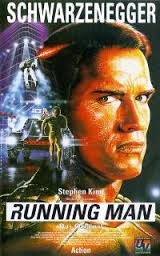
RUNNING MAN
US, 1987, 96 minutes, Colour.
Arnold Schwarzenegger, Maria Conchita Alonso, Yaphet Kotto, Jim Brown.
Directed by Paul Michael Glaser.
Running Man is a futuristic fable in the vein of The Blade runner. It is set in Los Angeles in the year 2019, shows concentration camps, shows the focus of popular entertainment and television and a gladiatorial game modelled on quiz shows. This is reminiscent of Logan's Run.
The story is based on a novel by Richard Bachman, a pseudonym for Steven King. The film serves as a vehicle for Arnold Schwarzenegger - who appears to be a bit more comfortable with the blend of ultra strong heroics and deadpan lines that he is given. An interesting, entertaining, if violent, science fiction parable. It was directed by Paul Michael Glazer, of Starsky and Hutch, who also directed Band of the Hand.
1. An Arnold Schwarzenegger vehicle? Audience expectations? Tough action? Right-wing perspective on law and order?
2. The blend of science fiction and imagination about the future? Films like 1984, Blade runner, Logan's Run? A film of deadly games, parallel to the Roman Colosseum and gladiatorial combat? Action, heroics, spoof? The work of Stephen King?
3. The presentation of the future: the camps and their ugliness, the city slums, the 1984 use of the television set, the games shows and their audiences, the contrast with luxury? The world of the TV studios? The area for combat, the squalor and the factories? Special effects and stunts? Musical score?
4. The focus on the camp, totalitarian regimes, the escape, the use of computers, the men and their desperation, as a group, having to trust each other? The escape, the man who rushed early? The television screens, the slums? The game 'Running Man' and its effect?
5. Ben as hero: Arnold Schwarzenegger's style? His story, the massacre, the video of his barbarity, the irony of its having been edited and his innocence? The real-video? In prison, getting out? The trust of the group?. The doctor and the underground? His brother's apartment and the encounter with Amber? Going on the holiday, the airport, his being caught? Damon Killian and game guest, Ben taken, medical
examination, drugs, the clothes for the game show?
6. The game show, the work of Damon Killian, publicity and the crowd adulation? Ben and his stance against Damon? The crowd, the slide, the run, the stalkers and their violence, meeting his friends and their being projected into the chase? The pursuit, the violence? The death of the stalkers and audience reaction? The buzz-saw man, the stalker with fire, the dynamo? Battle of wits and strength?
7. Amber, in the apartment, the encounter with Ben, at the airport, giving him away, the information on the television set, her questions, checking the files, being caught, made a guest for the game, the chute, the pursuit, with the computer expert, knowing the code, sharing the dangers with Ben?
8. The death of his friends, the wounding of the negro, the code-breaker and the electrocution? A sense of mission, the underground, giving the code, jamming the airwaves, the final attack?
9. The stalkers and their violence, the irony about the three winners being on holidays in Hawaii and their skeletons? Killian's invitation to Ben to become a stalker? The fake death and the tape?
10. Killian and their people, the Roman bloodlust, the contestants and the spoof about questions and guesses, the prizes, the woman choosing Ben? The office parties, the betting in the slums, the crowd's sympathies and fickleness?
11. Damon and his crew, the contact with the Justice Department, a tyrant, his trying to bargain with Ben---pushing the stalkers out, their deaths, trying to control audience reaction? The final confrontation with Ben? His going down the chute and his violent death?
12. The battle to win? A fable about a violent future? A violent present?
Published in Movie Reviews
Published in
Movie Reviews
Tagged under
Saturday, 18 September 2021 19:24
Running Brave
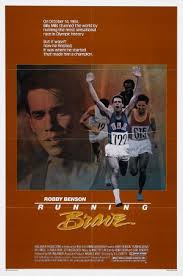
RUNNING BRAVE
Canada, 1987, 93 minutes, Colour.
Robbie Benson, Pat Hingle, Claudia Cron, August Schellenberg.
Directed by D.S.Everett.
An entertaining popular story of an American athlete. It focuses on Billy Mills, a reservation Indian, who has an ability at running, gets an opportunity to go to university, feels the pressures of racial tensions as well as the winning ethos of his coach. Seeming to fail in his endeavours, he returns to the reservation, enlists in the Marines, marries his sweetheart and trains. Eventually he is selected for the Tokyo Olympics - and succeeds in the 10,000 metres (incidentally beating the favourite Australia's Ron Clarke).
Billy Mills was in the tradition of Indian athlete Jim Thorpe (whose biography. Jim Thorpe All American, Man of Bronze starred Burt Lancaster).
Robbie Benson is his usual self in the central role. Pat Hingle has a good role as his coach. There is nothing particularly new in the treatment of the theme - but it is done efficiently. The Director, Canadian Donald Shebib (Going Down the Road, Second Wind) wanted his name taken from the film and the credit is to D.S. Everett for direction.
1. An interesting film about sports endeavour and achievement? the focus on the American Indian and his achievement? American themes?
2. The portrait of Americans in the 60's? the Indian reservations? The university campuses? Athletic training? the Tokyo Olympics? the use of locations? editing and pace - especially for running and training? the musical score - and the songs, like 'A Summer Place', echoing the period?
3. The title and its focus on athletic achievement, courage? its focus on the Indian athlete, the successful Brave?
4. The portrait of Billy Mills? Robbie Benson's presence in the central role? his life at the reservation? the background of the Sioux way of life? his winning the scholarship to the University of Kansas? his response to coach Easton? the pressure of precedence where Indians had given up and gone back home? the pressures of the white world, prejudices, academic standards? the racial intolerance? Billy and his adapting? the encounter with his room mate and the beginning of breaking down prejudices? the effect of the training on him, the ethos of winning? the emphasis on success? his exhilaration in running? what it did for his inner spirit? in nature? the encounter with Pat Harris? the beginnings of a romance? the encounter with his brothers and sister? there reaction to Pat and her white life style? the criticisms of Billy and his reaction? the pressure from the insurance company - sponsorship, success? his sense of responsibility? his reaction against the training, the regimentation? his beginning to lose? the decision to run away? the effect of his returning home? his Olympics hopes? the reaction to the children? their sense of achievement through him? his friendship with Frank, his work, art, comments on the reservation, fear of leaving, his suicide? Billy and the marines and his success? his marrying Pat? training, selection? his place at the beginning of the 10,000 metres? the drama of his running, beating the favourite? the reaction of coach Easton? Pat? what he had achieved for himself and his people?
5. Coach Easton and the styles of the American university, the rigorous training regimes, the psychological techniques for imposing pressure? his understanding of Billy Mills? his decisions about his training, speaking to him, goading him? expectations of failure? the insurance companies? his disappointment? his reaction to his Olympic achievement?
6. The white students at the university? prejudice, intolerance? the roommate and the breaking down of prejudice? Billy's gaining -friends? the encounter with Pat, the romance, the white patterns, his family rejecting her life style, his marrying her? her sharing in his achievement?
7. The portrait of the Indians, the way of life at the reservation, the outskirts of American society, the rules and regulations on the reservation? life style? Billy's coming from the reservation, his brothers and his sister, the visit to the white household and the reaction? his return home, his being different, the running and the training, the effect of the kids, the friendship with Frank and the impact of his suicide? the film's comment on the treatment of the American Indians in the 60's?
8. The world if big business - at the universities, the insurance companies, scholarships and sponsorships?
9. The Olympic Games and their prestige, aura? training, selection? hopes and ambitions? Billy's atonement and techniques in the success at the Olympics?
10. A film about human nature, origins, way of life, pressures, ethos of success, self respect, relationships, achievement?
Published in Movie Reviews
Published in
Movie Reviews
Tagged under
Saturday, 18 September 2021 19:24
Running
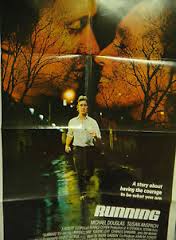
RUNNING
Canada, 1976, 96 minutes, Colour.
Michael Douglas, Susan Anspach, Lawrence Dane, Eugene Levy, Charles Shamata.
Directed by Steven Hilliard Stern.
Running is a minor athletics/domestic drama. Written and directed by Steven Hilliard Stern, writer and director of many telemovies, this is a Canadian production with two American stars. Michael Douglas is competent in the role of a drop-out from medical school, law school and various businesses, who takes on marathon running training and goes to the Olympic team. Susan Anspach is his long-suffering wife.
The film lacks the dramatic impetus that it might have had - too many scenes of running. This, however, may make it acceptable to fans of running and athletics.
1. Interesting and entertaining drama? Athletics, domestic?
2. Production values: the American city, home, the streets, business, athletics, Olympic preparations? Editing and pace for the running sequences? Score?
3. The title and its focus? As a physical activity for Michael? Psychological activity? Goal in life? Meaning tor his life?
4. The portrait of Michael - his background, dropping out, ambitions, training, education? His running and its meaning for him? Olympic hopes? The effect on him, on his wife? Family? His attempts to save his marriage? His wife's wanting to leave him? His coach and the memories of the past? his decision? Running and achievement?
5. Janet and the children ordinary family life, their reactions to Michael and his work, to his running? Janet seeing him as a professional failure? Her lack of sympathy for his running? her wanting to get divorced? Relationship? The final decision? Familiar material from domestic dramas?
6. The world of business, Michael's place in it, failures, advice from managers and workers?
7. The world of athletics, rigorous training, health, the exhilaration of running? His goal, temptation to drop out, persevering, injury, desperation? The final marathon and his personal achievement?
8. '70s and '80s interest in athletics, sport and fitness? An interesting presentation of this theme? The repercussions on family life? On individual achievement and meaning in lite?
Published in Movie Reviews
Published in
Movie Reviews
Tagged under
Saturday, 18 September 2021 19:24
Runner Stumbles, The

THE RUNNER STUMBLES
US, 1979, 88 minutes, Colour.
Dick Van Dyke, Kathleen Quinlan, Maureen Stapleton, Beah Bridges, Ray Bolger, Tammy Grimes.
Directed by Stanley Kramer.
The Runner Stumbles is an entertaining romantic melodrama, somewhat amplified by a thudding score and some purple patches of dramatics. The director is Stanley Kramer, who produced crisp dramas like The Men and High Noon in the '50s and then directed multi-starred blockbusters including Judgment at Nuremburg, Ship of Fools and Guess Who's Coming to Dinner. He aims at wide-appeal drama incorporating relevant issues. Which brings us to the fact that this film is about a priest and a nun and issues of religious commitment and celibacy - and the priest on trial for the nun's murder. The treatment is generally anti-sensational.
The popularity of the issue will ensure an interested audience. Before commenting on the themes and treatment, one notes that the unexpected star is Dick Van Dyke. He gives a sincere performance, often convincing, which tides us over his somewhat stolid acting style in the more heightened scenes. It is a sympathetic portrait of a lonely and ageing priest who has not been able to fulfil his potential as priest and who, while capable of enthusiasm and stirring, falls back on disappointment, routine and staid answers and a fearful and rigid interpretation of law. He is a man of repressed feeling. Kathleen Quinlan (Deborah of I Never Promised You a Rose Garden) is charming as a young Irish nun, full of vivacity and naive dedication - which she is not hesitant to act on or voice. One notes also an expert performance by Maureen Stapleton (Airport, Interiors, Lost and Found) as the complex, devoted housekeeper. Tammy Grimes is a small-town spinster devoted to her dying father, Ray Bolger is strict, humourless administrative Monsignor and Beau Bridges is the down-and-out defence lawyer.
So much for brief review. Some reflections on the themes. The film is set in the 1920s, making it easier to watch, since the time and the customs are getting more remote. This has the helpful effect for an '80s audience of making us think about priests, nuns, ministry, celibacy, anguish without too much distraction of judging pros and cons of contemporary crises. (It has also been pointed out that the danger is that audiences presume we have the right answers in the present and that people were more stupid in the past than they really were.)
By setting the film in the '20s, with the styles and piety of the time, the film distances us from our contemporary presuppositions and makes us reflect more on the issues. While aspects of clerical administration, canon law requirements and the language of pastoral ministry (especially the stoic fortitude needed for grief, temptation and decisions) have modified considerably, the picture of isolated presbyteries and convents, survival in prayer and serving parishioners and school children is not entirely unfamiliar (even in the middle of a large city). Recent renewal attempts in the Church have emphasised the need for authentic prayer and community support - but practice, as always, lags behind theory.
Father Rivard here has been relegated to obscurity and the writing of an erudite thesis. His God seems a hard God - one that anyone could lose faith in if a crisis arose - and, if no-one knows how to help. This happens and this is his tragedy.
Sister Rita has gone through a tough system, has played at being a nun since girlhood but, it seems, has never reflected on her femininity and capacity for affection and love. It is tested, hurt and cut short. These two characters highlight the celibacy issue, not in terms of a verbal discussion/argument, but, as cinema and drama do in deliberately contrived style, emotionally. We feel for the stoic priest who has theoretical answers but can't cope with affection, depression and loss of faith. We feel for the attractive nun who has taken life for granted and, in trying circumstances, has found that her life is not what she thought it was. The film poses the issues. It is a murder mystery/trial and so answers are not forthcoming. The film will clearly reinforce attitudes of those who find consecrated celibacy an anomaly. However, it might also raise some questions. For those who believe in the possibility and live (as does the author) a commitment of celibacy, I hope it jolts too-easy theory and reminds us that sympathy and support are as important as decision-making.
1. The significance and tone of the title? The image, the scriptural background, the quote from the prophet Isaiah? The implications as applied to priests and nuns?
2. Stanley Kramer's production values: the stars - Dick Van Dyke playing against type? The setting of the small mining town, the 1920s? The adaptation of the play to the screen? The importance of the structure: the development of the plot, the use of flashbacks? The psychological drama? The court case? The religious implication?
3. The film as a murder mystery: clues, motivation, suspects? The quality of the puzzle? The linking with the melodramatic developments of Father Rivard and Sister Rita? The audience and the final solution?
4. The setting of the 1920s - the small depressed mining town, its appearance, age, buildings, the mines, the church, presbytery, convent, houses? Father Rivard as parish priest of this depressed town? Toby as the scruffy lawyer, drinking? Amos and the jail? The film and its use of decor, sets? The importance of the period?
5. The 1920s and the religious themes? The Catholic Church structures and styles of the tine? The role of priests and nuns, vocations? Prayer., the sacraments? The audience looking at the 1920s with the hindsight of the changes of the '60s and '70s? The comparisons, critique? The nature of religious rules, structures? External behaviour, dedication? The status of priests and nuns and expectations? The nature of prayer, celebration of Mass, confession? The lack of personalism of later decades? The film distancing religious issues to the '20s so that the audience could appreciate the values more as well as offer a critique?
6. The impact of the story on a Christian audience, Catholic audience? A nonreligious audience? The awareness of celibacy and its nature, commitment, possible solutions? Laws of celibacy for secular priests, for nuns? Respect for Catholic traditions and regulations, hostility? The treatment of character and plot within rules and expectations? Men and women having to cope with difficulties, using means available, the possibility of scandal?
7. The portrayal of priests and audience presuppositions about them? The tradition of priests on the screen? Dick Van Dyke and his portrayal of Father Rivard? The initial prison sequences, the cumulative effect of the flashbacks? The establishing of his life as a seminarian, priest, his role in ministry? His being relegated to 'the sticks'? His writing of his book and the irreverence of such erudition out in the parish? The Monsignor and the strict administration of the diocese? Father Rivard and the clashes with the elderly sisters, their strict rules even about knocking? The contrast with Sister Rita and her attractiveness? His working with her, disapproving of some of her forward methods? His walking up to the hill and the discussions with Sister Rita? The importance of her confession and his rejection of it? His parish work as illustrated by Erna and her father? The father's death and his treatment of death and compassion? The friendship with Mrs Shandig, her work in the presbytery? The growing attraction, his decision about the sick sisters and Sister Rita living in the presbytery? His regulation of a month lack of communication? Growing tensions, the lie to the Monsignor? The importance of the fire? His acknowledgement of his love for Sister Rita? The visual presentation of the kiss within the context of the drama, the fire? The irony of Sister Rita's murder at this juncture? The people and their accusations and disregard of Father Rivard?
8. The quality of Father Rivard's faith, dedication as a priest? His disappointments, despair? His discovery of personal relationships with Sister Rita? The trial and his anguish, his outburst? The various people in the town and their hostility? Toby and his attempts to help? The court sequence and the surprise revelation of Mrs Shandig's guilt? His visit to the cemetery and ambiguity of his future? The audience leaving Father Rivard in his dilemma? How realistic a portrait of a priest and his dilemmas?
9. How attractive was Sister Rita? A young colleen, her arrival, her outspokenness, pleasant manner, the confrontation with the old sisters especially in their illness? The teaching of the children the song and singing it throughout the town? Her classes? Her relationship with Mrs Shandig and helping her to read? The outings with the children? The walks on the hill and the discussions with Father Rivard? Her awareness of herself, her role as a nun, her thinking about vocation since she was a little girl? Her changing attitude, her confession, her need for talking it out with Father Rivard? The hardships of the month and the tension within the presbytery? Her telling lies to save Father Rivard with Monsignor? The build-up to the fire, the rescue of the nuns? Her falling in love, the kiss, her hopes for the future? The cruelty and brutality of her death?
10. The portrait of Mrs Shandig - her work in the presbytery, her past, her devotion to Father Rivard, infatuation and jealousy? The visits to the shop and her learning to read? Her friendship with Sister Rita? The co-existence in the presbytery? The lengths she went to to protect Father Rivard? Her breakdown after the death? Her presence in the court, the melodramatics of her telling the story, the imagery of serpents used to describe Sister Rita? Her description of the killing? The pathos and cruelty of her violence?
11. Toby and his place in the town, a scruffy young lawyer, his collaboration with Father Rivard and talking with him in prison, his attempts to help in the court?
12. Erna as representing the people of the town, her devotion to her father, her narrow life, the discussions with Sister Rita, Sister Rita's consolation of her at her father's death, the contrast with Father Rivard's hard attitudes? The irony of her testimony In court and her marriage outside the church?
13. The portrait of the older nuns and their harshness, Monsignor and his laying down of the law, his reactions in the court? - Was this too heavily handled in contrast with Father Rivard and Sister Rita?
14. The presentation of the mining town, the various people and their attitudes to Father Rivard, to the school, narrow and hard outlooks?
15. Insight into the role of priests and nuns in their work, in their life? Their dedication to God and religious spirit? Coping with problem in their private life?
16. How well did the film blend melodramatic romance with murder mystery and exploration of religious themes?
Published in Movie Reviews
Published in
Movie Reviews
Tagged under
Saturday, 18 September 2021 19:24
Rumour of War, A
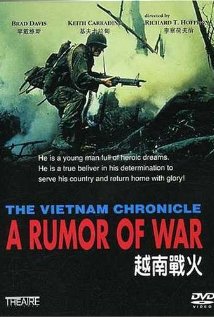
A RUMOUR OF WAR
US, 1980, 195 minutes, Colour.
Brad Davis, Keith Carradine, Stacy Keach, Steve Forrest, Michael O'Keefe, Brian Dennehy, Dan Shor, Jeff Daniels.
Directed by Richard T. Heffron.
A Rumour of War is based on the memoirs of the central character Philip T. Caputo. His friend Murphy, portrayed in the film by Keith Carradine, acted as technical adviser.
The film goes back to the atmosphere of America in the early '60s and Kennedy's Camelot. After the assassination and the involvement in the Vietnam war, there were mixed attitudes for American heroes. The film shows the Marines with their traditions and their being out of place in a war they did not understand. The strain on the Marines told in such incidents as the My Lai massacre. The central action and dilemma of this film echoes that kind of American brutality towards the Vietnamese and the court martial stances taken. Brad Davis, of Midnight Express, is good in the central role. There is a strong supporting cast including Brian Dennehy as the tough sergeant.
Unfortunately, the film was made after Coming Home, The Deerhunter and Apocalypse Now, which seem to have presented something of the last cinema images of the Vietnam war. To that extent, the film seems tame. It was directed by Richard T. Heffron, director of many telemovies and such films as Future World and I, the Jury.
1. The impact of Vietnam on American history? on the world of the '60s? The importance of films about Vietnam? Recording facts, preserving history? Re-assessment of involvement in the light of later decades and understanding? The consequences of the Vietnam war? Vietnam and America as seen by the '80s?
2. The important Vietnam films and their visualising of the war? Their dramatic statements? Their seeming to be the last word on film of the war? The anti-climax of this film in its time? The influence of the Vietnam films e.g. Apocalypse Now? The long tradition of American war films and marines in action? Patriotism, life in the Marines, buddies, action sequences, crises?
3. The film as based on an authentic story? Philip Caputo's book? The adaptation for the screen? Murphy as technical adviser? The memory of Caputo's involvement in the war, the re-assessment of his actions?
4. The atmosphere of the '60s, American involvement in Vietnam, the early days of the war, the ethos of American involvement, the escalation of the war and American bewilderment, the '70s and the collapse, the surrender of Saigon, the '80s and the reassessment?
5. The focus on the '60s: Phil and his life in Chicago, his voice-over comments, his girlfriend and her demands, the family and their demands, arguments, studies etc? His relationship with his girlfriend - and the intrusion of the Kennedy assassination? The pathos of the funeral? The destruction of the ideal and the effect on the men of Philip's generation?
6. The joining of the Marines and the motivation? Partly as rebellion, partly patriotism, partly reaction to the death of Kennedy? The intensity of the training sequences? The ridicule of Philip? The importance of the fighting, the emphasis on killing and wanting to kill? The beliefs of the Marines? Self-assertion? The group and their interaction in training? The traditions of films showing training sequences?
7. The transition to Vietnam: the change in lifestyle, the terrain and the heat, the early days of American advisers and their patrols while the Vietnamese worked, searching for Viet Cong, the various strategies and the inability to find the Viet Cong? The sudden sniping, mines and the loss of a foot etc? The growing attack and the reality of the war?
8. How well did the film present the Vietnam issues: American presence, military hardware, relationship with the South Vietnamese government? The representatives of the South Vietnam military and their brutality? The contrast with the villagers working their farms, the ordinary way of life, lifestyle - homes, cooking while the house was being searched, teaching etc.? The brutality? The Vietnam hiding caches of arms in villages? Mines, deaths and reprisals? The growing number of victims on each side? The elusiveness of the enemy in foreign terrain?
9. The contrast with Saigon, leave, R & R. Vietnamese prostitutes and their sympathy but inability to speak English. their listening?
10. The group and the training in America. friendships, Caputo's comment that they were good men? The initial work in Vietnam., the digging of trenches - and their taking it easy with criticism from severe officers? The digging, the walking, the helicopter landings? Snipers and mines? Missions and growing danger?
11. The individuals and the repercussions of Vietnam: Woodward and his youthfulness. his getting sunstroke and being shipped out? The man with glasses from Philadelphia and his son? His death while Caputo was in Saigon? The nervous marines -,~& the incident demanding the passwords from Caputo? The presentation of both black and white American Marines?
12. The friendship with Walter? Murph and his laconic attitudes. learning Vietnamese? Their working together? Walter's disgust at Philip going berserk? His later visiting him at headquarters? His death and Caputo's reaction? Murphy observing the war and people's behaviour?
13. The character of the Sergeant and his experience, urging the men on, helping, wisecracks, standing up with his sore back, the painfulness of his death and its impact on the men?
14. The experience exasperating Caputo, his drive for excellence, his having to make decisions, the violence and the gunfire, rescuing the men, the helicopters, his going berserk and his being changed? His work at the desk? The statistics? The various officers - the officer with his interest in statistics. percentages and body counts? The officer with the mad glint and his intense wanting higher authorities to see bodies and the various shippings of the bodies in the mud? The role of the officers and their orders? The unreality of the headquarters?
15. Caputo's return to battle, his vicious attitudes. reaction to Walter's death? Hard attitudes. the missions. the mines, the lead back to the village? The older Sergeant and his offhand manner. his stopping in disbelief at Caputo's behaviour - and later bringing the gift but saying that he would not support him?
16. The revenge: the mission, the cover-up, the explanations, the intensity of the two men wanting revenge on the Vietnamese, the raid of the house, the shooting of the men? (Contrasting with Caputo's apology after searching the house earlier in the film?) The motivation, the panic, mistakes, the preparing of the story, the aftermath?
17. Caputo court martialled, the reading of the charges, his loyalty to fellow Marines, changing his testimony? The complexities of law. morality. his mixed motivations? Murphy's sympathy for him? Audience sympathies for him?
18. The end of his career in Vietnam? Leaving in bewilderment, ideals shattered, life changed, lacking certainties, measuring warfare by old norms and finding them inadequate? The end of Caputo's career in Vietnam symbolising the withdrawal of the Americans?
19. The film as war drama, psychological drama. symbol of the American failure in Vietnam?
Published in Movie Reviews
Published in
Movie Reviews
Tagged under
Saturday, 18 September 2021 19:24
Rumble Fish
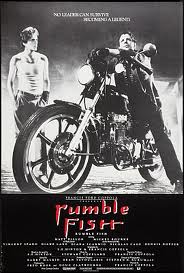
RUMBLE FISH
US, 1983, 94 minutes, Black and white/Colour effects.
Matt Dillon, Mickey Rourke, Diane Lane, Dennis Hopper, Diana Scarwid, Nicolas Cage, Vincent Spano.
Directed by Francis Ford Coppola.
Rumble Fish is the third film version of an S. E. Hinton novel. Matt Dillon, the star of Rumble Fish, also appeared Tex and The Outsiders. This time the screenplay was co-written by Hinton and Francis Ford Coppola. (Hinton herself appears briefly as the hooker in the main street.)
The film is difficult for its audiences rather than a straightforward presence of the youth sub-culture. Where Tex had its gentle touches and The Outsiders (directed by Coppola and made back-to-back with Rumble Fish) uses colour and mythical evocations of memories of Gone With the Wind for its gentle and harsh portrayal of youth, this film uses striking black and white photography, special effects (with echoes of Ingmar Bergman e.g. with clocks) for an unrelenting picture of youth hanging around, fighting, experiencing violence.
The film emphasises its style a great deal, drawing attention to itself. Using Tulsa, Oklahoma, the film shows the picture of alienated youth. To highlight the theme, the Siamese fish (which bite one another, driven to frenzy even by the sight of another male) are filmed in colour as symbolic of the main characters.
Another film indicating Francis Ford Coppola's independence of mainstreams of Hollywood film-making - from The Godfather films, The Conversation to Apocalypse Now and One From The Heart.
1. The title of the film, the symbolism of the Siamese fish? Their fighting, worked into a frenzy at male images? The tradition of alienated youth and their rumbles? Fights, violence, dying? The fish and their symbolism and colour? The tank taken to the river to set the rumble fish free - a kind of escape or a kind of death?
2. The work of S. E. Hinton? The popularity of her novels? Her insight into youth? The problems of youth, family backgrounds, education? male and female roles? Fighting and surviving? Macho images? American themes?
3. Francis Ford Coppola and his career, his idiosyncratic styles and treatments? Audience popularity or not?
4. The impact of the black and white colour photography and its sharp and steely look? The small fish solely appearing in colour? Tulsa, Oklahoma and the life of the city, the streets, the homes, the landscapes? The special effects for the clouds and the speeding of time? The images e.g. of clocks - with or without hands, in gaudy settings as in the pet shop? The visuals, compositions, postures, the choreography of fights? The use of realism and fantasy - especially Rusty James and his levitating? Patty's appearances as a sex object?
5. The insight of the film into youth? A portrait of youth, subculture, rebels? Americana? Peers and pressure, loyalties? Antagonisms? Macho images? Fights, weapons, brutality, blood? The men fighting? The women as supportive or as sex objects? Independence? Modelling by older heroes? Images, ideals? Depression, violence and death? The need to escape?
6. The city as a character: steely cold, the high-rise buildings, the streets, the underpasses? The verbal comparisons with California? California as a dreamland - real or not? Held up as the goal for escape by the Motor Cycle King? The sea and California?
7. Matt Dillon as Rusty James, the focus of the film? Matt Dillon's presence, style? Identification by male audiences? Attractive for female audiences? An image or a character? Style, poses? A contemporary icon? His being referred to as Rusty James (except by his father)? His role in the group and the peer influence? The leader? His place in the city? His love for Patty? The fight, the rumble - with Patty and then coming just in time? His success, injury? His brother as an ideal? The significance of his absence, his return? His fighting and saving Rusty James? The injury and Steve's concern? Caring for Rusty James, treating his wound with alcohol? Rusty James and the police, going home? His schooling - and images of Patty in the King? His being suspended from school? Hanging out around the town - his friends, their willing or unwilling acknowledging of his leadership? Steve as an intellectual yet friendly with Rusty James? The party - and the sex sequence? His alleged friend organising this to take Patty away from him? The domestic scenes with Patty, passionate, talking? Following her from church with the nuns? Her little sister? The bond with his brother, their talk, hearing about his mother, California? His brother as the outsider? The scenes with their father, his drinking, the bonds in the family? The continual and ominous presence of the police? Antagonism towards the Motor Cycle King, towards Rusty James? The violent rumble. knives and stakes? His being hit - and his levitating, seeing himself, Patty, his friends, father? His returning to himself? His assessment of people's reaction to him? His brother taking the fish from the pet shop. taking him to the river, his death? The finale after his brother's death? His brother's bequest of the bike, riding to California and to the sea? Freedom or not? An American symbol? The Motor Cycle King - the graffiti praising him, his being someone, his absence being felt, his return, saving Rusty James, home, the friendly talk between the two, talk about their mother? His plaintive and wistful tone of voice, ethereal reflections? A guide and model for Rusty James? Helping him? The symbolism of the fish? His taking them, freeing them, dying?
9. Rusty James' friends: Steve and his study, concern for Rusty James, helping him with his injuries, walking and talking? The friend who betrayed him and contrived to take Patty?
10. Patty as an ordinary young girl in the city, church, the nuns, Rusty James following, relating, the romance, at home, the mother's comments, the young sister, a passionate girl, appearing in Rusty James' fantasies, her resentment of the stories about the sex night, her going with Rusty James' friend and disdaining him? Dennis Hopper as the boy's father, drinking, at home, memories? Kindly but helpless? The police and their ominous and continual presence, the callous shooting of the Motor Cycle King? The atmosphere, the importance of atmosphere building to conflict, the rumbles. the police - the final tableau with all the characters of the film assembled, Rusty James passing them? A summary of the film? His escape to California?
14. An enjoyable film? A difficult film? action of youth and sub-culture themes?
Published in Movie Reviews
Published in
Movie Reviews
Tagged under
Saturday, 18 September 2021 19:24
Ruckus
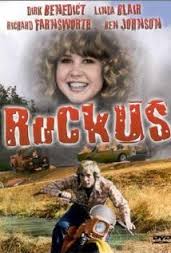
RUCKUS
US, 1981, 91 minutes, Colour.
Dirk Benedict, Ben Johnson, Linda Blair, Richard Farnsworth, Matt Clark.
Directed by Max Leven.
Ruckus is one of the many stories of veterans back from Vietnam and the repercussions on them and their avenging themselves on society. This story, set in the redneck South, is reminiscent of First Blood. Kyle is a minor Rambo. (This film was made at much the same time as First Blood.)
The film shows a suspicious and bullying society. it shows an older generation grieving for dead loved ones. It also shows the violence and suspicion inherent in a society - and the delight of the come-uppance of this kind of society. Getting it out of one's system and the love of a good woman seem to be the message on the road to sanity and rehabilitation for the veteran. Dirk Benedict (Battlestar Galactica, The A Team) enjoys himself with the stunt work. Linda Blair is the heroine. Ben Johnson is the grieving father. Richard Farnsworth is the wise sheriff. Matt Clark one of the victims of Kyle.
One of those action features, full of stunt work that entertains the broad audience.
1. A ruckus and raucous entertainment? Comedy? Underlying serious tone? A piece of Americana? The South, the Vietnam war, the veterans?
2. Small budget: southern location, photography, stunt work and action? Jaunty score?
3. The title and its reference to Kyle and his impact on the town? The visual style and action to support the ruckus theme?
4. The film's comment on American involvement in the Vietnam war, the veteran and his psychological health, institutions, memories of the war, needing to get the war out of his system? The grief of parents and wives with sons and husbands dead? The reaction of the people who didn't go to war - suspicion, misunderstandings? The need for some kind of understanding of the veterans?
5. Kyle as a wanderer, his not speaking, the raw hamburger, the mud on his face? Mr. Bellows and his questions and his refusal to answer? The reaction of Bellows, of the police? Of the men in the town? Chasing him, ridiculing him, his violence and martial arts against them? The refuge with Jenny, his being normal with her? Talking normally. reacting normally? His washing. change of clothes? His enjoying her company. the motor-bike ride and stunts? Mr. Bellows and his wariness, the men and their suspicions, the chases, the police? His outwitting them? The final reconciliation and happy ending? A broad look at a Vietnam veteran and his troubles, institutionalisation, release, being released from his traumas?
6. Mr Bellows and his grief, his interrogating Kyle? Pursuing him? Within the law? Jenny and her relationship to Bellows, her baby? Observing Kyle, welcoming him into her home, fears, friendship, the bike rides, support, falling in love? Lyrical and romantic sequences?
7. The sheriff and his benign attitude, handling the situation?
8. The raucous men of the town, buddies, banding together, suspicions, chases, violence? The knockabout farce style? Cars wrecked, exploding? The police and their inability to manage?
9. A country road film with serious undertones?
Published in Movie Reviews
Published in
Movie Reviews
Tagged under
Saturday, 18 September 2021 19:24
Ruby
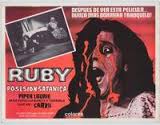
RUBY
US, 1977, 95 minutes, Colour.
Piper Laurie, Stuart Whitman, Roger Davis, Janet Balwin.
Directed by Curtis Harrington.
Piper Laurie made such a successful comeback in Carrie as Carrie's mother that producers have found this vehicle for some more of the same. It is a mixture of gangster thriller and the occult trend (overtones of The Exorcist) where a murdered racketeer takes over his daughter's personality to wreak revenge. Director is Curtis Harrington who made such effective thrillers as Games and What's the Matter with Helen? However, the production looks as if it was low budget and quickly made with short running time and the accent is on blunt horror rather than subtlety. Nevertheless, it is an enjoyable variation on the old violent melodrama formula.
1. An enjoyable horror film? Production qualities? Budget, re-creation of atmosphere, the stars?
2. The film seen within the 70s interest in ESP, parapsychology, horror? A good example of this genre?
3. How well did it introduce traditional gangster themes and blend them with parapsychology? The overall interest, audience involvement, plausibility of such supranatural intervention?
4. How appropriate were the visuals with the violent deaths, the suggestions of madness? Appropriate, exploitive?
5. The significance and tone of the opening: the lighting, the atmosphere? Gangsters, romance, violence, death? The importance of this being reprised throughout the film? As a kind of chorus, suggestion for understanding the strange happenings? The effect on Ruby, on Vince, the birth of Leslie? Micky's death and his avenging presence? The link of Micky with Leslie and the plausibility of his possessing her? Comment on the gangsters cinematic styles but their leading in an unusual direction?
6. How did Micky become central to the film? Audience response to his death, Roby's responsibility, Jake and the other members of the gang killing him? Ruby's explanation of his story and background, her love for him? The motives for his death? His wanting to be present at and avenge? The growing sinister presence? His speech? His taking over Leslie in behaviour, speech, appearance? His wreaking vengeance on the members of the gang? How frightening?
7. Ruby within this context? Piper Laurie’s style, appearance, her red clothing and jewellery? Her involvement in the initial set-up, the birth of Leslie? Her support of the gang over the years? Her running of the drive-in and her living with her memories of the club, advertisements, her ability for acting, singing? The dashed dreams? Her love for Leslie and her protection of her? Jake's presence, her dependence on Vince and the other members of the gang? Her erratic behaviour, her drinking, her sensuality? The importance of her singing, her songs? And the background of songs about her? How interesting a character? The plausibility of her career, her being confronted by Micky and the effect it had had on her? Her confession about gouging Jakes eyes out? Micky's ultimately taking her to himself in death? At the same spot?
8. The atmosphere of realism created by the drive-in? The irony of the horror film being shown and the people going into it, their reactions? Vince and his management of the drive-in? The assistant? The girl going in with various men? The location of the drive-in? The in-jokes about films?
9. Audience response to the first death and the man choked with the film? The reaction to this? The anticipation of the other deaths and the strange happenings surrounding them? At the drive-in? The visuals? The man dead in the swamps after taking the girl out there?
10. How did Leslie fit into this atmosphere? Her age, her devotion to her mother, to Vince? Seeming retarded? The importance of her seeing the dead man in the tree? The doctor and his reaction? His investigation of her parapsychological behaviour? Her gradually being possessed and the effect that this had? The erratic behaviour? The suffering? The physical appearance and her speaking with Micky's voice? Her contorsions etc.? How convincingly and visually did the film present her as a medium?
11. The importance of the introduction of the doctor, his background from the prison? His skills and his uncovering so much of the truth?
12. Vince as the hero of the film? His relationship to Ruby and love for her, his devotion to Leslie? Calling in the doctor? His management of the drive-in? Micky's spirit threatening him with violence? The fact that he was saved?
13. The ominous presence of Jake, his blindness? His death? The revelation that Ruby had destroyed his eyes for love of Micky? The appropriateness of the flashback and its horror?
14. The effect of all these happenings on Ruby? Her going back into the past, her singing? The significance of her life? Her gradually being drawn to Micky to prove herself? The return to the scene of his death and the culmination in her dying to be with him?
15. How appropriate the ending - a culmination to these events? What is the value of this kind of story? Realism, horror fantasy? Audience interest and enjoyment? A parable of conscience and the effect of crime, responsibility, punishment?
Published in Movie Reviews
Published in
Movie Reviews
Tagged under
Saturday, 18 September 2021 19:24
Royal Flash
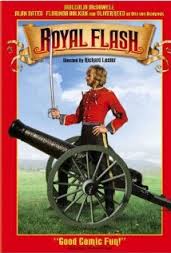
ROYAL FLASH
UK, 1975, 118 minutes, Colour.
Malcolm Mc Dowell, Alan Bates, Florinda Bolkan, Britt Ekland, Oliver Reed, Michael Hordern, Joss Ackland.
Directed by Richard Lester.
The Flashman novels are highly enjoyable, irreverent satires on 19th Century Empire embodied in the cad of cowardly, exploitive cads, Harry Flashman. He is involved in so many of the big events of the century that ironic comment can be made on historical characters and movements. This film portrays Volume 2, presents the characters and plots (eg. Bismarck, Lola Montez) with the style indicating to audiences the irony of it all. Director Richard Lester adds goon-comic touches and highlights the parody of the "Prisoner of Zenda". It is enjoyable but could have been vastly more so. It could have been less flashy - with more Flash.
1. The interest and appeal of this film? The 19th Century? Britain, satire, costume spectacular? Its qualities as entertainment?
2. The importance of style, for example, the detail of the London club, the London Bath, the Bavarian Court, Bismarck and his background? The effect of audience on this detailed 19th Century reconstruction?
3. The importance of the film being mock-heroic? The effect of this on the audience, the detailed impact of satire, the nature of parody? The portrayal of good and bad? moralizing via mock-heroic? The parody of "The Prisoner of Zenda" etc.?
4. Flashman as a mock-heroic character? Malcolm McDowell's interpretation? His style? The contrast with Rudi as a mock-heroic character? Alan Bates' style of portrayal?
5. The characterization of Flashman in terms of mock-heroic? His opening speech to the boys at Rugby from which he was expelled (the satire on Patton): the satire on his heroism at Afghanistan? His life at the club, his push with Lola, his antagonism of Bismarck, his popularity amongst the English? His goading of Bismarck to boxing? His way of life in England? His going to Bavaria for money? His shooting, tricked in the sexuality? The hold of Bismarck and Rudi over him? Their vengeance and diplomacy? The plot and his participation by fear? His attempts to escape? His training as the prince and the humour? The meeting of Irma and the parody of royal occasions? The wedding ceremony. the honeymoon? The death threat and the fall from the bridge? His life with the rebels? Encounter with the real Karl Magnus? The sword fighting and the final escape?
6. The picaresque view of a hero? A hero and coward? The momentum of the events and audience involvement?
7. Rudi as an opportunist? His background, his working for Bismarck, his flair for the theatrical, especially for the rescue from the castration? His coaching of Flashman,, his standing in the background, the final swordfight,' the Hungarian Roulette at the end? What was being communicated by this characterization?
8. The contrast with Bismarck? The Teutonic attitude? How serious a portrait of Bismarck? The boxing, the plot, the ambitions for Germany, the fencing with Flashman, wounding him, the details of his plans to destroy him? Drawing a map for thirty years? (The use of Wagner's music?)
9. The portrayal of Lola Montez? The historical reference, the encounter with Flashman? Her life in London, sexuality and Flashman? Her hold in Bavaria? Entertaining Ludwig? Her final escape and robbing of Flashman?
10. The Princess Irma and her frigidity? The convincing portrayal of Teutonic frigidity? The change with the honeymoon? The comic jibes at the Germans2
11. The portrayal of the rebels, their attitude towards Bismarck? Their sieging of the castle.. the mock-heroism of the swim and the fight?
12. Rudi's attendants, the sinister man who fell from the bridge, the man with the iron fist? The comedy and melodrama? For example, dancing the polka, the final fight?
13. The contribution of such minor characters as the headmaster, the lawyer, Lola Montez's duel, Flashman appearing on the stage etc.?
14. How enjoyable was the set pieces of London, the siege of the club, the shooting in Bavaria, the training and the marriage?
15. The entertainment value of the film? The comment on the 19th Century? A 20th Century look at the 19th Century?
Published in Movie Reviews
Published in
Movie Reviews
Tagged under
Saturday, 18 September 2021 19:24
Roustabout
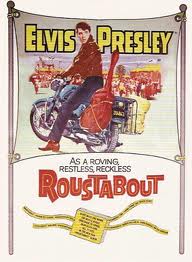
ROUSTABOUT
US, 1964, 101 minutes, Colour.
Elvis Presley, Barbara Stanwyck, Sue Anne Langdon, Joan Freeman, Leif Erickson.
Directed by John Rich.
Roustabout is a routine Elvis Presley entertainment. It has a carnival setting and Elvis is a motor cyclist who has a talent for singing and drawing crowds. However, the interest in the film for many viewers will be Barbara Stanwyck as the owner of a carnival. (Commentators noted how she appeared in Edith Head designed dungarees and was never seen doing any of the manual work but was nevertheless a strong carnival leader.)
The film follows the usual pattern of Presley vehicles - highlighting the character, his being something of an outsider, clashes, falling in love, proving his worth. The film has a strong supporting cast and was directed by John Rich (Wives and Lovers, Boeing Boeing).
1. An entertaining Presley vehicle? Personality and presence? Type of character? America in the '60s? Singing, his particular style?
2. The use of Techniscope, carnival locations? A piece of Americana? The musical score? The songs, the vocal accompaniment?
3. The title and the focus on the carnival and Charlie Main's work? The humour of the carnival, the dangers and rivalries, money difficulties? Predictable themes?
4. Presley as Charlie: young, tough, orphan, karate, singing? In trouble, motor cycle, the clash with Maggie Moore? The encounter with Cathy Lean and her father? The opposition by her father? His pushing him off the road? The arguments and temper? Maggie helping him? Repairing the cycle, the broken guitar? His work as a roustabout? His work, interest in Cathy? His staying? His success with the songs? Not wanting to be tied down, the contract? The offer from Harry Carver? The dispute with Joe, the lost wallet, the joyride on the Wall of Death, rows? Going to Carver? Success? Cathy's arrival, discovering they're in love? His going back to Maggie? Rescuing it from bankruptcy? Typical Presley hero?
5. Barbara Stanwyck as Maggie Moore - the tough owner, the encounters with Charlie, friendship with Joe and Cathy, financial difficulties, the contract, Charlie's going, difficulties and Charlie to the rescue?
6. Cathy as typical heroine? Carnival assistant? Falling in love? Clashes with Charlie? Going to see him, reconciliation? Her father and his stern manner, clashes with Charlie?
7. The background characters of the carnival? Humour, glamour? Harry Carver as big business, unscrupulous, contracts?
8. The image of the young American offered by Presley - for the audiences of 1964? Now?
Published in Movie Reviews
Published in
Movie Reviews
Tagged under